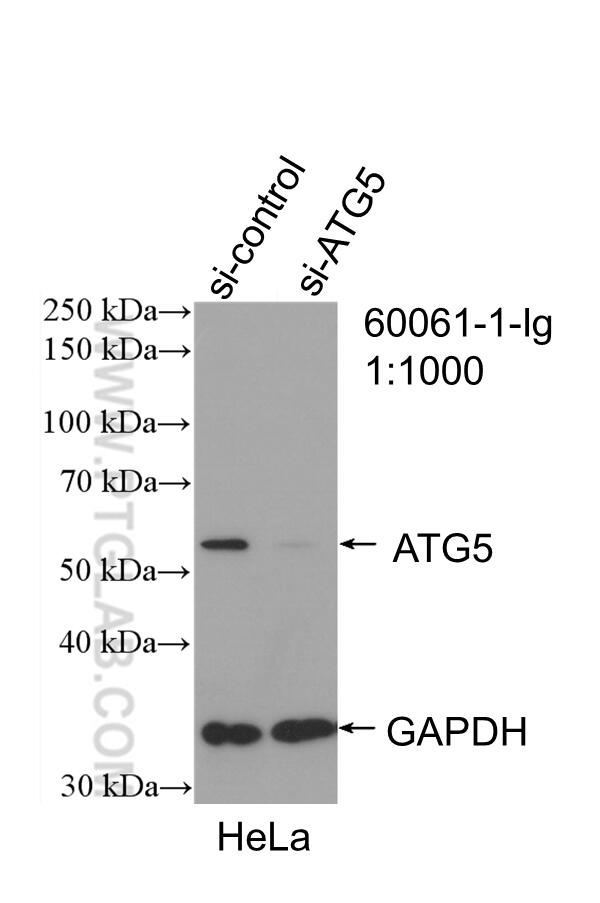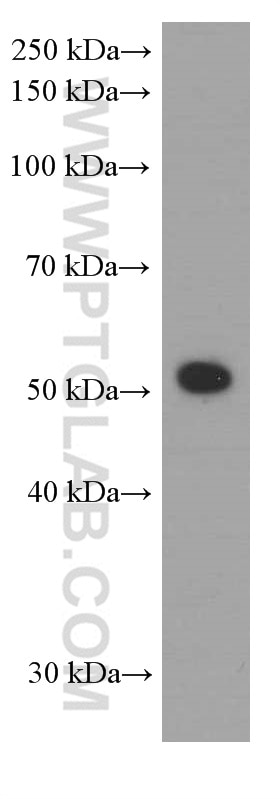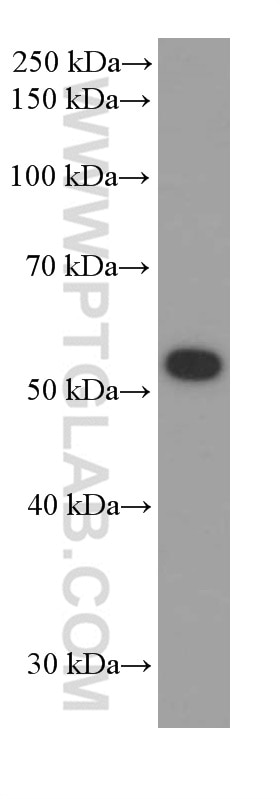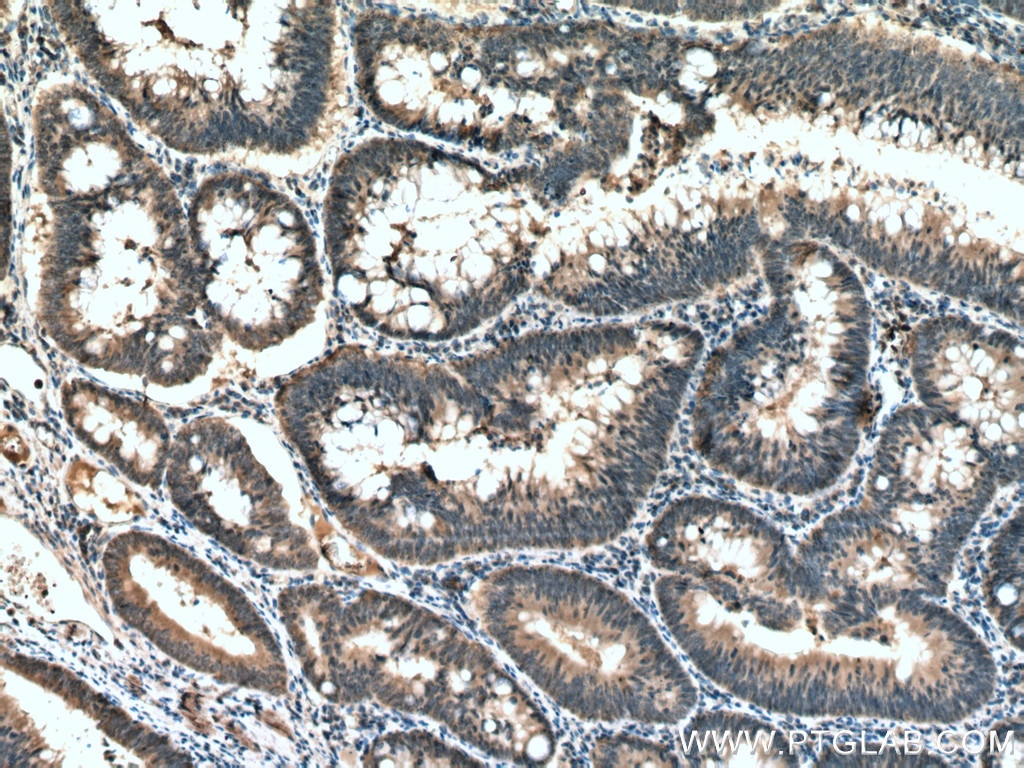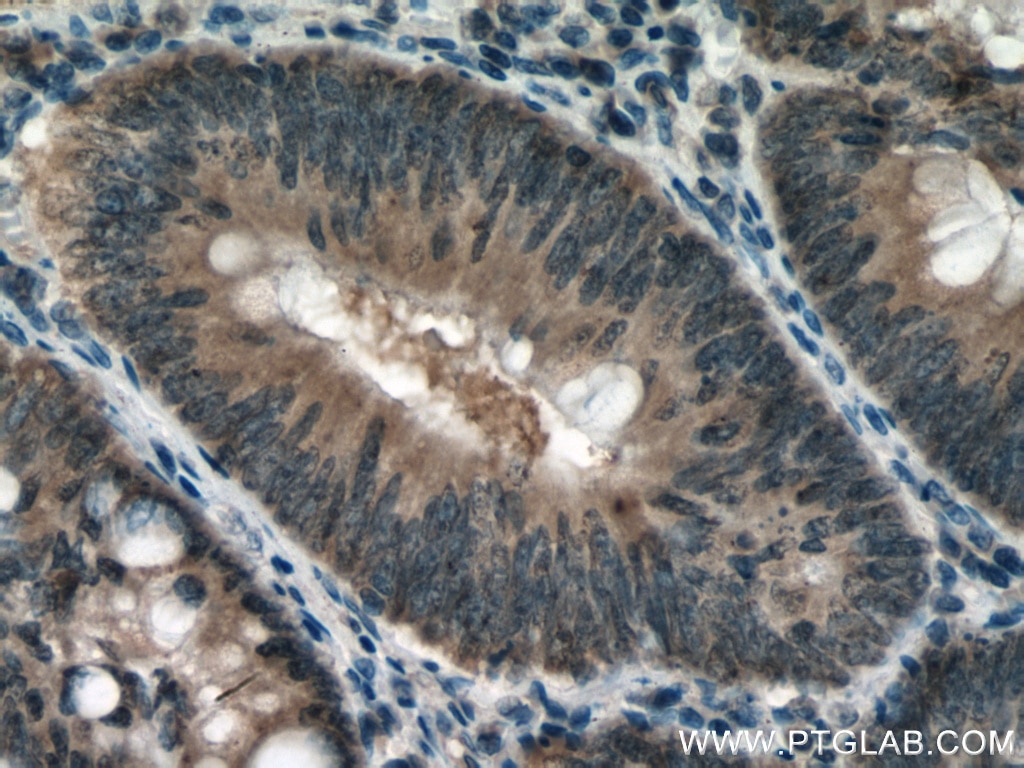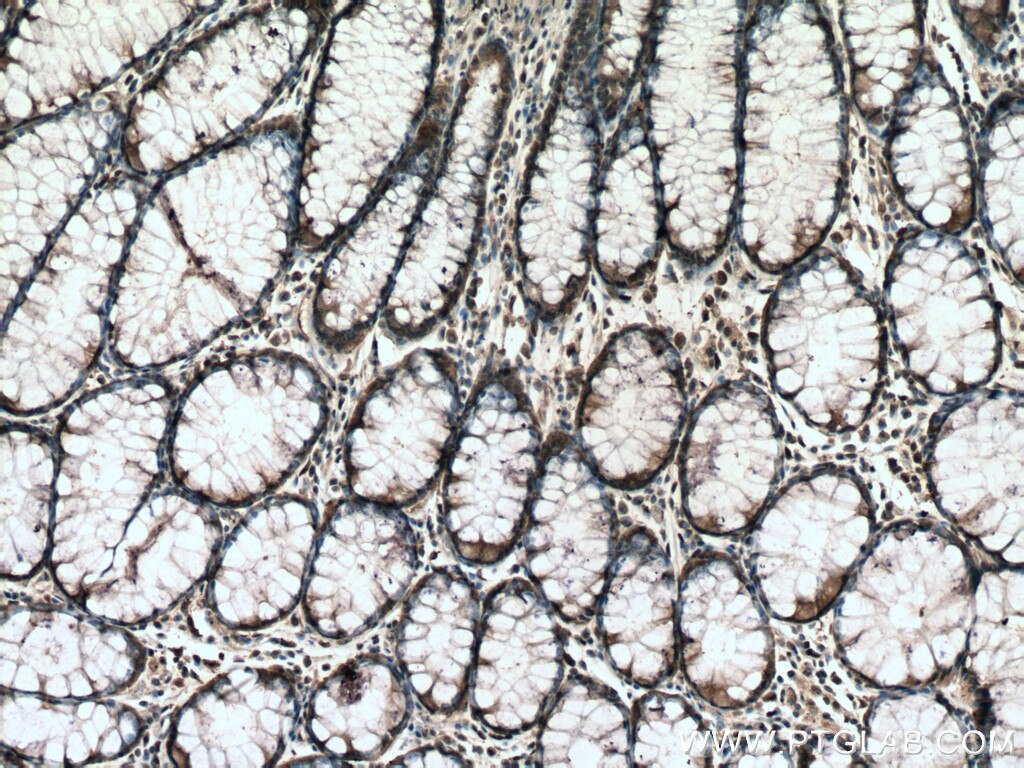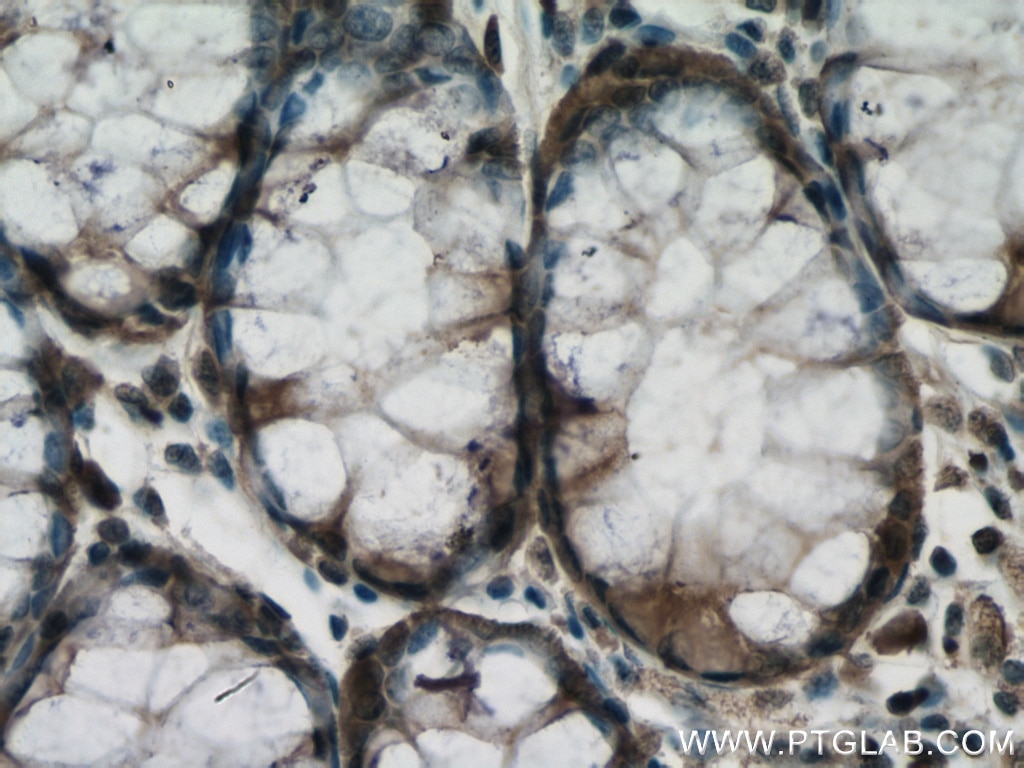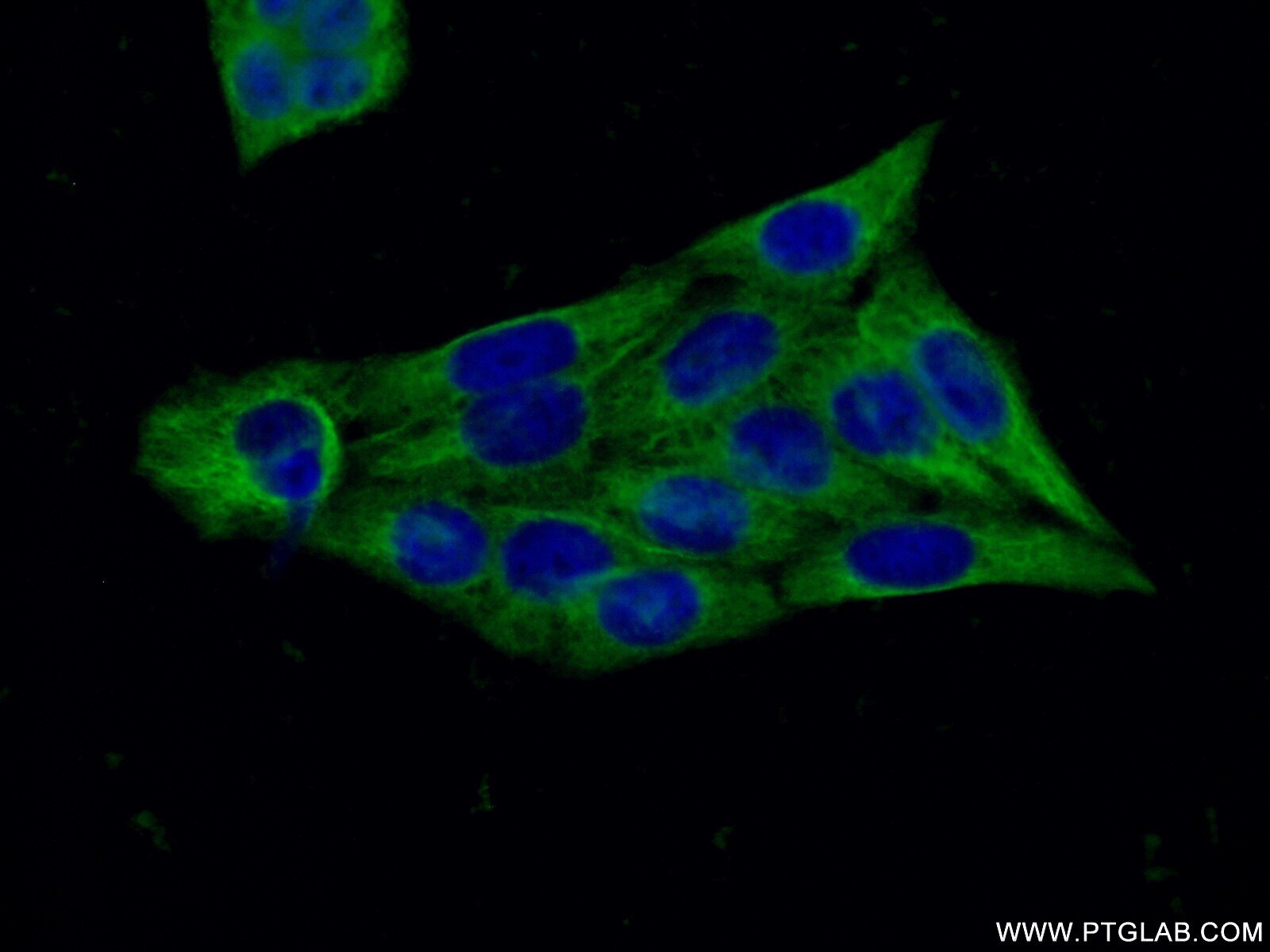Validation Data Gallery
Tested Applications
| Positive WB detected in | K-562 cells, HeLa cells |
| Positive IHC detected in | human colon cancer tissue Note: suggested antigen retrieval with TE buffer pH 9.0; (*) Alternatively, antigen retrieval may be performed with citrate buffer pH 6.0 |
| Positive IF/ICC detected in | HeLa cells |
Recommended dilution
| Application | Dilution |
|---|---|
| Western Blot (WB) | WB : 1:500-1:2000 |
| Immunohistochemistry (IHC) | IHC : 1:50-1:500 |
| Immunofluorescence (IF)/ICC | IF/ICC : 1:50-1:500 |
| It is recommended that this reagent should be titrated in each testing system to obtain optimal results. | |
| Sample-dependent, Check data in validation data gallery. | |
Published Applications
| KD/KO | See 1 publications below |
| WB | See 5 publications below |
| IHC | See 1 publications below |
| IF | See 1 publications below |
Product Information
60061-1-Ig targets ATG5 in WB, IF, IHC, ELISA applications and shows reactivity with human, mouse samples.
| Tested Reactivity | human, mouse |
| Cited Reactivity | human, mouse |
| Host / Isotype | Mouse / IgM |
| Class | Monoclonal |
| Type | Antibody |
| Immunogen |
CatNo: Ag0214 Product name: Recombinant human ATG5 protein Source: e coli.-derived, PGEX-4T Tag: GST Domain: 28-275 aa of BC002699 Sequence: TEREAEPYYLLLPRVSYLTLVTDKVKKHFQKVMRQEDISEIWFEYEGTPLKWHYPIGLLFDLLASSSALPWNITVHFKSFPEKDLLHCPSKDAIEAHFMSCMKEADALKHKSQVINEMQKKDHKQLWMGLQNDRFDQFWAINRKLMEYPAEENGFRYIPFRIYQTTTERPFIQKLFRPVAADGQLHTLGDLLKEVCPSAIDPEDGEKKNQVMIHGIEPMLETPLQWLSEHLSYPDNFLHISIIPQPTD 相同性解析による交差性が予測される生物種 |
| Full Name | ATG5 autophagy related 5 homolog (S. cerevisiae) |
| Calculated molecular weight | 32 kDa |
| Observed molecular weight | 55 kDa |
| GenBank accession number | BC002699 |
| Gene Symbol | ATG5 |
| Gene ID (NCBI) | 9474 |
| RRID | AB_2243256 |
| Conjugate | Unconjugated |
| Form | |
| Form | Liquid |
| Purification Method | Thiophilic affinity chromatograph |
| UNIPROT ID | Q9H1Y0 |
| Storage Buffer | PBS with 0.02% sodium azide and 50% glycerol{{ptg:BufferTemp}}7.3 |
| Storage Conditions | Store at -20°C. Stable for one year after shipment. Aliquoting is unnecessary for -20oC storage. |
Background Information
ATG5, also named as APG5L and ASP, belongs to the ATG5 family. It is required for autophagy. It plays an important role in the apoptotic process, possibly within the modified cytoskeleton. Its expression is a relatively late event in the apoptotic process, occurring downstream of caspase activity. Autophagy is a catabolic process for the autophagosomic-lysosomal degradation of bulk cytoplasmic contents. Formation of the autophagosome involves a ubiquitin-like conjugation system in which Atg12 is covalently bound to Atg5 and targeted to autophagosome vesicles. It mediates autophagosome-independent host protection.
Protocols
| Product Specific Protocols | |
|---|---|
| WB protocol for ATG5 antibody 60061-1-Ig | Download protocol |
| IF protocol for ATG5 antibody 60061-1-Ig | Download protocol |
| IHC protocol for ATG5 antibody 60061-1-Ig | Download protocol |
| Standard Protocols | |
|---|---|
| Click here to view our Standard Protocols |
Publications
| Species | Application | Title |
|---|---|---|
Autophagy Autophagy core protein ATG5 is required for elongating spermatid development, sperm individualization and normal fertility in male mice. | ||
Autophagy The ciliary protein RPGRIP1L governs autophagy independently of its proteasome-regulating function at the ciliary base in mouse embryonic fibroblasts. | ||
Cancer Cell Int PCK1 activates oncogenic autophagy via down-regulation Serine phosphorylation of UBAP2L and antagonizes colorectal cancer growth | ||
Cell Biosci A missing piece of the puzzle in pulmonary fibrosis: anoikis resistance promotes fibroblast activation. | ||
Mol Med Rep Autophagy is essential for flavopiridol‑induced cytotoxicity against MCF‑7 breast cancer cells.
| ||
Cells Dev Enhanced autophagy suppresses inflammation-mediated bone loss through ROCK1 signaling in bone marrow mesenchymal stem cells. |

